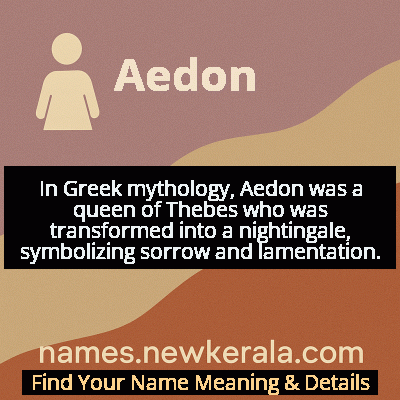Aedon Name Meaning & Details
Origin, Popularity, Numerology Analysis & Name Meaning of Aedon
Discover the origin, meaning, and cultural significance of the name AEDON. Delve into its historical roots and explore the lasting impact it has had on communities and traditions.
Name
Aedon
Gender
Female
Origin
Greek
Lucky Number
3
Meaning of the Name - Aedon
In Greek mythology, Aedon was a queen of Thebes who was transformed into a nightingale, symbolizing sorrow and lamentation.
Aedon - Complete Numerology Analysis
Your Numerology Number
Based on Pythagorean Numerology System
Ruling Planet
Jupiter
Positive Nature
Optimistic, inspirational, and creative.
Negative Traits
Scattered, exaggerating.
Lucky Colours
Yellow, gold, purple.
Lucky Days
Thursday.
Lucky Stones
Yellow sapphire.
Harmony Numbers
1, 2, 9.
Best Suited Professions
Arts, writing, communication.
What People Like About You
Creativity, optimism.
Famous People Named Aedon
Aedon of Thebes
Mythological Figure
Transformed into a nightingale after tragic family events involving her husband and children
Aedon Pandareus
Mythological Princess
Daughter of Pandareos who appears in Homer's Odyssey as a tragic figure
Aedon Melantho
Literary Character
Featured in modern reinterpretations of Greek mythology in novels and poetry
Name Variations & International Equivalents
Click on blue names to explore their detailed meanings. Gray names with will be available soon.
Cultural & Historical Significance
Extended Personality Analysis
The personality traits associated with Aedon reflect the name's rich mythological heritage and symbolic meanings. Those bearing this name are often characterized by deep emotional intelligence and artistic sensitivity, mirroring the nightingale's association with beautiful, melancholic song. They typically possess strong intuitive abilities and a natural capacity for empathy, making them excellent listeners and trusted confidants. The transformative aspect of Aedon's myth suggests individuals who demonstrate remarkable resilience, able to navigate difficult circumstances and emerge with new wisdom and strength. Their creative nature often manifests in various artistic pursuits, from music and writing to visual arts, where they excel at expressing complex emotional landscapes. While they may experience periods of introspection and occasional sadness, this emotional depth fuels their artistic expression and compassionate nature. Their protective instincts, particularly toward family and loved ones, reflect the maternal themes in Aedon's original story, making them loyal and devoted partners, parents, and friends.
Modern Usage & Popularity
In contemporary naming practices, Aedon occupies a unique niche as a distinctive mythological name that avoids being overly common while maintaining classical gravitas. Its usage has seen a gradual increase in the 21st century, particularly among parents with interests in classical literature, mythology, and unique name choices. While it doesn't rank in official baby name statistics, online naming forums and social media platforms show growing interest in Aedon as an alternative to more popular Greek names. The name appeals to parents seeking names with deep cultural roots, beautiful phonetic qualities, and meaningful symbolism. Its rarity makes it attractive to those wanting a distinctive name that won't be shared by multiple classmates, while its mythological background provides rich storytelling opportunities. Current usage trends show it being adopted primarily in English-speaking countries, with some presence in European nations where classical education remains strong. The name's elegance and historical depth position it well for continued, though likely limited, usage among discerning parents.
Symbolic & Spiritual Meanings
Symbolically, Aedon represents one of the most poignant metaphors in Greek mythology—the transformation of human suffering into artistic beauty. As the nightingale, she embodies the concept that great art often emerges from profound emotional experience, particularly pain and loss. Her symbolism extends to themes of voice and expression, representing the power of song and story to process and transcend difficult experiences. The nightingale's eternal song symbolizes persistence and resilience, the ability to continue creating beauty despite circumstances. Aedon also represents maternal complexity—the fierce love, protection, and sometimes tragic mistakes that characterize family relationships. In broader symbolic terms, she signifies metamorphosis itself, the human capacity for radical change and adaptation. Her story serves as a metaphor for the creative process, where raw emotion is refined into artistic expression, and personal tragedy becomes universal art that speaks across generations and cultures.

